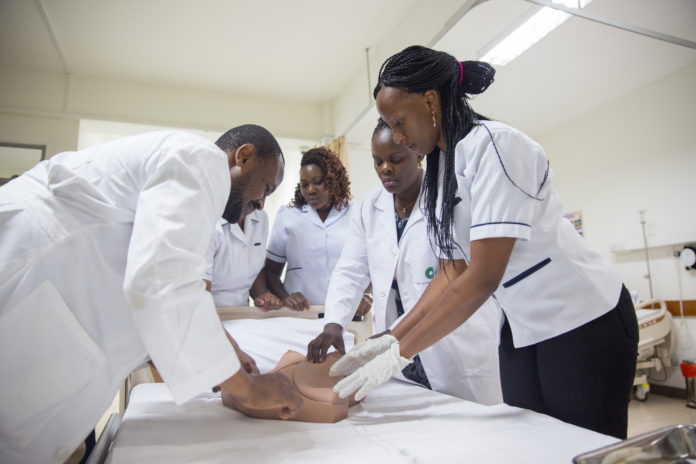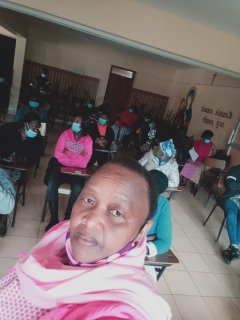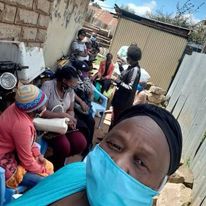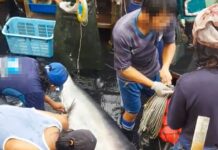
By Roseleen Nzioka
Nairobi, Kenya: As we begin the interview over the phone, Ms. Jane Frances Angalia who was diagnosed in 2014 with triple-negative breast cancer, which accounts for about 10-15 percent of all breast cancers globally, is worried not only for herself but for other cancer patients struggling to get by day by day.
“I cannot count the number of funerals for cancer patients I have attended this year. We have lost count of the number of cancer patients we have lost since March’, says a somber Ms. Jane Frances. At the time she was diagnosed, the cancer was in stage 3B.
This means that it had invaded her breast skin and she had to start chemotherapy immediately. Eventually, her breast was surgically removed. She says it was always difficult to get cancer treatment in Kenya even before Covid-19 struck the world and now the crisis has reached a morbid state.

Ms. Angalia is a Public Relations, Communication and Advertising part-time lecturer and has had to take a leave of absence totaling five years to take care of her own health. “I have had seven surgeries. Six in India and one in Turkey. This has taken a toll on my finances and my health,” says Ms. Angalia but she soldiers on knowing that she is not alone and that she is luckier than most other cancer patients who cannot afford the treatment both locally and abroad.
Apart from the near-impossible financial burden borne by cancer patients, Ms. Angalia says there other crucial needs that determine the outcomes for cancer patients. Ms. Angalia says that screening and prevention and treatment are the pillars of medical care.
She fears that for some people deferred care and missed diagnoses during the Covid-19 pandemic have caused precious lost time and deep anxiety to her cohorts. “Just imagine how many people have contracted cancer and they actually don’t know and therefore cannot begin timely treatment. We expect the mortality numbers to rise if cancer itself is not treated as a pandemic. We need urgent interventions from the county level to the national level,” says Ms. Angalia.
Not one to sit around waiting for others to act, Angalia founded Cancer Information Support Network (CISN), which collaborates with other cancer associations to offer psychosocial support to cancer patients. She says cancer treatment takes a toll on one’s time, energy, and resources.
She had to take over five months to leave of absence which meant that with reduced to zero income, Ms. Angalia could not sustainably meet her medical bills and sustain herself. Subsequently, she’s had to use up all her savings, sell her properties and call on friends, colleagues, and relatives to help her raise more than Ksh7 million over the years for surgeries and post-surgery treatment.

When she founded the Cancer Information Support Network, her goal was to reach out to the most vulnerable cancer patients who cannot afford the treatment and healthy diet required to accompany the strong medicines. “Nothing is more fulfilling to me than reaching out to other women cancer survivors, listening to them and doing something about their suffering,” she says.
Thanks to her food drives during this Covid-19 pandemic, she has fed over 300 cancer patients within both Nairobi and Kiambu counties. She uses social media platforms for her food, clothing, shelter, and prosthesis campaigns for the most vulnerable cancer patients. Ms. Angalia says that the economic disruptions brought by Covid-19 where businesses shut down and many people lost their jobs resulted in the deaths of scores of cancer patients as their revenue streams dried up and they could no longer afford basics like food, shelter, and medicine.
Ms. Angalia says that depression and loneliness due to the stringent Covid-19 prevention measures such as keeping social/physical distance have also led to reduced interactions of home-grown cancer support groups. Being in the top tier of immune-compromised patients, cancer patients have also avoided going into medical facilities for palliative care, medication, and treatment for fear of contracting Covid-19 further compromising their own health, says Ms. Angalia.
She urges the government to pronounce cancer, a national disaster the same way it did with HIV in the 90s. This she says, would automatically facilitate the free screening and treatment of men, women, and children for all types of cancers. Her views are backed by a pilot study assessing the direct medical cost of treating patients with cancer in Kenya and published by the renowned Journal of Medical Economics. The pilot study states that the cost of cancer treatment in Kenya depends on the type of cancer, the modality, cost of medicines, and the type of inpatient admission with the greatest burden being the cost of medicines and inpatient admissions. 
This study can inform future initiatives among the government as well as private and public insurance companies to increase available resources to more effectively treat patients with cancer in Kenya. Another study published by Bio Med Central titled, “A review of Kenya’s cancer policies to improve access to cancer testing and treatment in the country”, states that apart from the cost borne by the patient, costs also remain a key factor for the hospitals.
“Costs remain a key factor in the acquisition of equipment, health personnel training, cancer treatment, and palliative care drugs, and improving infrastructure at national and county-level health facilities delivering cancer services,” the research states. It notes that while Kenya has made strides following the inclusion of cancer patients in NHIF and private insurance schemes, limits on the number of treatments, based on the type of cancer, modality, and costs of drugs, often result in incomplete treatments for patients and contribute to poor outcomes.
The research recognizes the role of media in disseminating information about cancer to the public: “as one of the main sources of information about cancer in the country, the media and civil society groups are also well-positioned to lead public education about cancer prevention as well as testing and treatment procedures. This can result in better patient-clinician interactions and promote informed engagement with policy-makers as well as demand for accessible and affordable cancer services from the government.”
The study states that the annual incidence of cancer in Kenya is about 28 000 new cases with an annual mortality of 22 000 cases, that is, 78.5% of the victims do not survive. Like the African experience, cancer is also said to be the third leading cause of death in Kenya, after infectious diseases and cardiovascular diseases.
The increasing cancer incidence levels in Kenya could be thought of as a reflection of the effects of major societal and environmental changes that have occurred in the past few decades such as dietary changes from traditional foods to carcinogenic foods, increased environmental pollution, large scale farming, occupational drift, industrialization, urbanization, the study states.
As anecdotally observed by Ms. Angalia, the study states that currently, the majority of cancer deaths occur in low- and middle-income households. Most patients currently pay out of pocket for treatment, and those who are insured are generally not covered for the full costs of treatment. This places a considerable burden on households if family members develop cancer.













